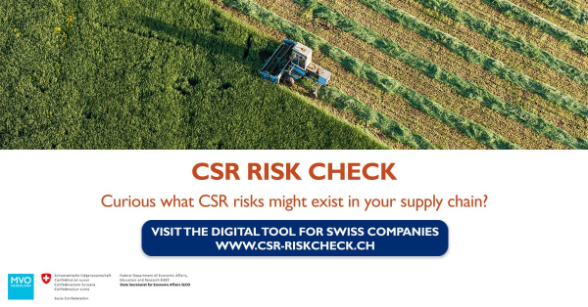The new guide and tool on Social Sustainability Standards for Public Procurement in the Textile Sector from the State Secretariat for Economic Affairs and The International Trade Centre provide all the information needed to strengthen social sustainability in public procurement of textiles. They offer a detailed assessment of 23 private standards that cover the textile supply chain, are based on the 10 fundamental ILO conventions and require a third-party verification mechanism. The guide also presents a procedure to follow in order to integrate these standards into the tendering procedure and information about 25 other additional social standards. The standards analysis tool details the requirements of each standard.
- CSR Risk Check
- Equal pay self-test tool Logib
- Due diligence processes in the tourism sector
- Self-monitoring tool to eliminate and prevent child labour
- Toolkit for addressing security and human rights challenges in complex environments
- Guide on Social Sustainability Standards for Public Procurement in the Textile Sector
CSR Risk Check: Identify quicky the social and environmental risks in your value chain

Swiss Companies that are active in foreign countries (e.g. export, import, production) may use the CSR Risk Check, an online tool to assess the social, environmental and governance risks in their value chain. The CSR Risk Check is anonymous and free of charge and will instantly provide a list of possible issues for countries and products in the form of a risk assessment. It also provides information on possible solutions to mitigate risks and suggests additional information sources. The CSR Risk Check serves to implement the OECD Guidelines for Multinational Enterprises on Responsible Business Conduct and the UN Guiding Principles on Business and Human Rights.
The CSR Risk Check is currently available in English and German, as it is a SECO pilot project.
.jfif.jpg)
Equal pay self-test tool Logib: Check your pay practice quickly and easily
The private sector plays a fundamental role in advancing gender equality and women's rights. From 1 July 2020, Swiss companies with at least 100 employees will have to carry out regular pay equity analyses. In order to facilitate the implementation of this obligation, the Confederation provides a free self-test tool - called Logib - to check whether there are any wage inequalities in a company with at least 50 employees. This software allows employers to make a simple review of their pay policy. Detailed instructions and the answers to frequently asked questions are provided in order to ease the use of this tool and the interpretation of the results.
For more information: Equal pay self-test tool Logib
Due diligence processes in the tourism sector
The Roundtable Human Rights in Tourism has developed a free online tool that allows companies active in the tourism sector to assess human rights impacts in their value chains.
This interactive and practice-oriented tool helps companies, especially SMEs, to implement their human rights due diligence. It enables them to identify, anticipate and respond to their potential human rights impacts and to have an overview of human rights risks in their value chains.
Self-monitoring tool to eliminate and prevent child labour
The International Labour Organization (ILO) has developed a mobile application that allows business managers and auditors to create interactive checklists that will help them ensure a child labour-free operation. The application provides best-practice recommendations for taking action.
Toolkit for addressing security and human rights challenges in complex environments
This toolkit developed by the Geneva Centre for Security Sector Governance and the International Committee of the Red Cross provides guidance and good practice for companies operating in complex environments, such as conflict settings. The toolkit was funded by the Swiss Confederation.
Guide on Social Sustainability Standards for Public Procurement in the Textile Sector





